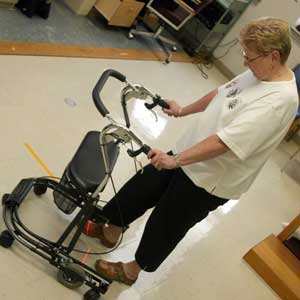 |
| A patient uses a laser-guided walking device in Dr. Turnbull's lab. (Pearce photo) |
Whether with a crowd at a club or alone in a living room, music has a unique power to make people want to move - even those who struggle every day to do so.
Parkinson's disease, which affects approximately 100,000 Canadians, occurs when certain neurons in the brain die, affecting the body's ability to move freely and smoothly. The symptoms vary by person but often include tremors, stiffness, a rigid facial expression, muffled speech and 'gait freezing,' where the patient becomes temporarily unable to walk at all.
Dr. George Turnbull, professor of physiotherapy at Dalhousie, has been helping patients with Parkinson's disease for over two decades. "Medication works well at first, but patients eventually become more and more inactive and they lose their strength, posture, endurance, and joint flexibility," he says. "People don't really die of Parkinson's; they die of inactivity. We're trying to keep people active for as long as possible."
Music and movement
The answer might be in song. For many patients, music seems to be able to lift them out of their frozen state, allowing them to walk - or even dance - for periods of time almost as if they were not suffering from the disease. Dr. Turnbull is part of a new research project examining this power, based out of the University of Calgary and also involving researchers at the University of Lethbridge. The entire project will last five years and is funded by the Canadian Institute for Health Research.Â
For his part, Dr. Turnbull will research and target ways to use musical cues to aid in the rehabilitation process. He believes that music may stimulate neuroplasticity: redirecting the brain's electrical signals away from damaged neurons onto new paths. By the project's conclusion, Dr. Turnbull hopes to create programs that help Parkinson's patients learn to walk normally both with and without music. "If a patient can take their headphones off, and still hear the rhythm in their head, they may still be able to walk," he comments.
If music can improve freedom of movement for Parkinson's patients, it would allow them to maintain their muscle strength, endurance and other physical attributes that are often lost to the disease. "Until we find a cure, we have to come up with ways to allow Parkinson's patients to function as well as they can for as long as they can, and exercise is a big part of that," Dr. Turnbull remarks. "Hopefully, music can help patients remain physically fit and overcome their functional difficulties."
